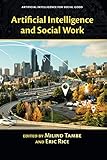Artificial intelligence and social work
Material type: TextPublication details: Cambridge Cambridge University Press 2021 Description: ix, 257 pISBN: 9781108444347Subject(s): Social justice | Social service--Technological innovations | Artificial intelligenceDDC classification: 361.3028563 Summary: This book marries social work and artificial intelligence to provide an introductory guide for using AI for social good. Following an introductory chapter laying out approaches and ethical principles of using AI for social work interventions, the book describes in detail an intervention to increase the spread of HIV information by using algorithms to determine the key individuals in a social network of homeless youth. Other chapters present interdisciplinary collaborations between AI and social work students, including a chatbot for sexual health information and algorithms to determine who is at higher stress among persons with Type 2 Diabetes. For students, academic researchers, industry leaders, and practitioners, these real-life examples from the USC Center for Artificial Intelligence in Society demonstrate how social work and artificial intelligence can be used in tandem for the greater good.
Demonstrates the potential for artificial intelligence to be used for social good
Provides several real-life examples that represent a broad range of topics and populations
Includes a discussion on the ethical principles of using artificial intelligence for social work interventions
TextPublication details: Cambridge Cambridge University Press 2021 Description: ix, 257 pISBN: 9781108444347Subject(s): Social justice | Social service--Technological innovations | Artificial intelligenceDDC classification: 361.3028563 Summary: This book marries social work and artificial intelligence to provide an introductory guide for using AI for social good. Following an introductory chapter laying out approaches and ethical principles of using AI for social work interventions, the book describes in detail an intervention to increase the spread of HIV information by using algorithms to determine the key individuals in a social network of homeless youth. Other chapters present interdisciplinary collaborations between AI and social work students, including a chatbot for sexual health information and algorithms to determine who is at higher stress among persons with Type 2 Diabetes. For students, academic researchers, industry leaders, and practitioners, these real-life examples from the USC Center for Artificial Intelligence in Society demonstrate how social work and artificial intelligence can be used in tandem for the greater good.
Demonstrates the potential for artificial intelligence to be used for social good
Provides several real-life examples that represent a broad range of topics and populations
Includes a discussion on the ethical principles of using artificial intelligence for social work interventions
| Item type | Current library | Collection | Call number | Copy number | Status | Date due | Barcode |
|---|---|---|---|---|---|---|---|
 Book
Book
|
Indian Institute of Management LRC General Stacks | IT & Decisions Sciences | 361.3028563 TAM (Browse shelf(Opens below)) | 1 | Available | 003540 |
Table of Contents
Part I:
1. Artificial intelligence and social work Eric Rice and Milind Tambe
2. The causes and consequences of youth homelessness Eric Rice and Hailey Winetrobe
3. Using social networks to raise HIV awareness among homeless youth Amulya Yadav, Bryan Wilder, Hau Chan, Albert Jiang, Haifeng Xu, Eric Rice and Milind Tambe
4. Influence maximization in the field Amulya Yadav, Bryan Wilder, Eric Rice, Robin Petering, Jaih Craddock, Amanda Yoshioka-Maxwell, Mary Hemler, Laura Onasch-Vera, Milind Tambe and Darlene Woo
5. Influence maximization with unknown network structure Bryan Wilder, Nicole Immorlica, Eric Rice and Milind Tambe
Part II:
6. Maximizing the spread of sexual health information in a multimodal communication network of young black women Elizabeth Bondi, Jaih Craddock, Rebecca Funke, Chloe Legendre and Vivek Tiwari
7. Minimizing violence in homeless youth Ajitesh Srivastava, Robin Petering and Michail Misyrlis
8. Artificial intelligence for improving access to sexual health necessities for youth experiencing homelessness Aida Rahmattalabi, Laura Onasch-Vera, Orlando Roybal, Kien Nguyen, Luan Tran and Robin Petering
9. Know-stress Subhasree Sengupta, Kexin Yu and Behnam Zahiri
10. A multidisciplinary study on the relationship between foster care attributes and posttraumatic stress disorder symptoms in foster youth Amanda Yoshioka-Maxwell, Shahrzad Gholami, Emily Sheng, Mary Hemler, Tanachat Nilanon and Ali Jalal-Kamali
11. Artificial intelligence to predict intimate partner violence perpetration Robin Petering, Mee-Young Um, Nazanin Alipourfard, Nazgol Tavabi, Rajni Kumari and Setareh Nasihati Gilani
12. SHIHbot Joshua Rusow, Jacqueline Brixey, Rens Hoegen, Lan Wei, Karan Singla and Xusen Yin
13. Ethics and artificial intelligence in public health social work David Gray Grant.
This book marries social work and artificial intelligence to provide an introductory guide for using AI for social good. Following an introductory chapter laying out approaches and ethical principles of using AI for social work interventions, the book describes in detail an intervention to increase the spread of HIV information by using algorithms to determine the key individuals in a social network of homeless youth. Other chapters present interdisciplinary collaborations between AI and social work students, including a chatbot for sexual health information and algorithms to determine who is at higher stress among persons with Type 2 Diabetes. For students, academic researchers, industry leaders, and practitioners, these real-life examples from the USC Center for Artificial Intelligence in Society demonstrate how social work and artificial intelligence can be used in tandem for the greater good.
Demonstrates the potential for artificial intelligence to be used for social good
Provides several real-life examples that represent a broad range of topics and populations
Includes a discussion on the ethical principles of using artificial intelligence for social work interventions

There are no comments on this title.